 |
Memories of a G.I. S/Sgt Christ M. Christoff |
Personnel
Mission Reports
January 1942 - June 1945
S/Sgt Christ M. Christoff
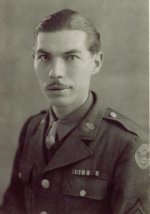 I started to keep a diary when we came to Molesworth, but that didn't last long. I heard "don't keep records of military activities." That put a end of my diary. If I had kept it, there may be another book on the 8th Air Force. No old notes, but I'll try to recall some interesting happenings during my stay at Molesworth.
I started to keep a diary when we came to Molesworth, but that didn't last long. I heard "don't keep records of military activities." That put a end of my diary. If I had kept it, there may be another book on the 8th Air Force. No old notes, but I'll try to recall some interesting happenings during my stay at Molesworth.
No heat in the Nissen or Quonset hut, coal ration used up, gone. No problem, empty can with scraps of rags, copper or aluminum tubing, a can of old engine oil placed above the "tent" stove. (We finally got rid of the English stoves that came with the huts.) Tubing was inserted in the oil can and dripped oil to the stove with the can of rags that we lit with a match. It worked for awhile. As you entered the hut, you smelled burned oil. You got used to it, besides you had some heat. On one of our rare inspections they caught up with us and we had to get rid of our oil burner as it was starting to clog up the chimney, plus it may cause some health problems.
On another inspection we had to get rid of our bunk light. We acquire wire, lamp sockets, bulbs, and wired each bunk with a bunk lamp.
Christmas time. Someone in the hut gets a Christmas package from home. Open it, what is it a bottle of mouthwash or hair tonic? No... remove the bottle cap and under the sealed wax cap you have a bottle of whiskey.
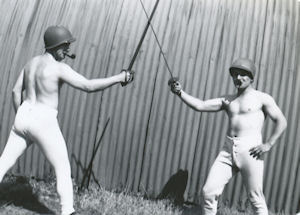
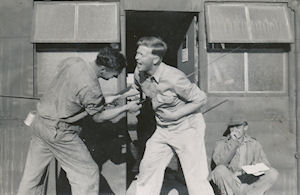
Chuck Williams, Dave Miller James Masters, Don Berger
There was the time some one got hold of some good pure alcohol. Got a can of juice that they served in the mess hall and mix it with the alcohol. Begin mixing, too much juice, not enough alcohol, too much alcohol, not enough juice. The brewmasters never did find the right mixture, but in the end as the liquids ran out there was a smile on everybody's face and I don't think any one felt any pain.
Get a frying pan, a big ham (source unknown) mess hall butter and a loaf of bread from the N.A.A.F.I., plus a hot fire, combine all and it's mmmmmmmmmm good. Ham is eaten up and gone, all is not lost we still have bread and butter. Frying bread in butter, late at night another delicacy, don't forget its wartime.
One of the first paydays with English money, play card games for keeps. I'll bet this coin, I don't have one like that, that's ok. two of these equals that one, no it don't, wait I have one like that. I'll call that bet. Months later I'll see your shilling and raise you a half crown.
A pass to big London town, go to Rainbow Red Cross Club. My buddy and I get a couple of tickets to a stage show. Some how or other we get to the theater. Didn't enjoy the show, left after the first act. Not knowing exactly where (black out) we were, we found a pub and entered. Something wrong here, found only four or six G.I.'s in the pub. Years later found out we visited a pub in Soho, notorious part of London.
Visit Northampton on a 48 hour pass, go to the dog track win a little, lose a little. Visit the barber shop for the works, shampoo, haircut, and shave for less than half crown, then to the public bath house for a soaking bath. Fresh eggs for breakfast, found a place just off the market square in Northampton.
After a few visits to London it didn't feel like you were on pass. Every time you turned around you were looking at someone in uniform. I must say and not being an expert on it, I think the English had a good railroad system for war time. Quit London for a while to visit other towns with less uniforms about.
The war in Europe was coming to a end decided to get one more pass to London. In London people were waiting for Churchill to tell them it's all over. The day that Churchill said it was over, I was on my way back to the base, missing out on the big celebration in London.
V.E. Day everybody confined to the base. A barrel of beer was brought to our area and we all drank to the end of the war in Europe.
During my tour in the ETO, the US Army Air Force decided I and some other radio maintenance men needed more schooling on a certain piece of' radio equipment. Can't recall how we were transported to a RAF base by plane, train, truck, or bike. I think we were billet for about a week living under RAF rules and regulations. The classes were good the mess was something else. The highlight of this British and American visit was the RAF Sergeant Club. Half and half, bitters, and stout and an American G.I. piano player would be tickling the ivories. I forgot his name, but before the war he worked for the "big" bands arranging musical scores. This fellow never had to buy a drink on the top of a old upright piano stood as many as ten or more pints of beer. "Hey, know this tune? How about playing this one, it goes like this." All you had to do hum, sing, whistle, or clap your hands and he would turn it into a Broadway hit tune.
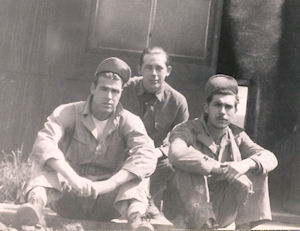
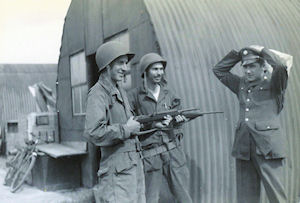
Owen Harkins, unknown, Christ Christoff Ted Wisocky, Chirstoff, Chuck Williams
Back in Molesworth with dirty dress uniform, no problem, take them to the hard stand uniform cleaning station. Procedure dip the woolen garment four or five times in the barrel of 100 octane gas. They come out clean as a whistle, crease still in, wrinkles very few. Next step hang them out to air for 3 or 4 days.
"Hell's Angels" a b-17 bomber is slated to fly back to the states, time to autograph your name on this special B-17. The right side of the rudder was just about filled, couldn't get a spot on the fuselage. Finally found a spot to put my mark on the left side of the rudder. Just my luck they seldom take pictures or look on that side of the plane.
Looking for a cribbage player or players go to the hardstands and look inside the crew chief tent you may find a cribbage board drilled on a bench. Stick around a cribbage player will show up soon.
The orange marmalade story. The early days before we received food supplies from the states, mess hall food was $*#%. To the rescue came orange marmalade and peanut butter on bread and mess kit cup of coffee. The meals did get little better and tastier, but just in case the meal hit the wrong spot, we had our back up of marmalade and peanut butter. (foot note: you will not find orange marmalade in this household.) Before you leave for work check your equipment mess cup, fork, spoon, knife, boots, bicycle, check air in tires, and then you're just about ready to go.
Then there was the time. I tried to get flying pay, not really just kidding. There was an engine change on one of the planes I worked on. A after checking the engine on the ground they give it a flying test. "You want to go up for flight test?" "Yes sir!" "Go get a chute." Chute and G.I. ready, lets fly. Did I ever pilot a B-17. Sure did. After take off and airborne I was asked if I wanted to sit in the co-pilot seat. The pilot asked if I wanted to take the stick (wheel) on this test flight. I may have flown the aircraft about five minutes. I did notice the pilot had his hands on the wheel all the time.
There's not too many and very few stories written about the ground personal in the Air Force. I wrote this story about the incidents and situations that I remember occur to me, while was in the Army Air Force and M.A.T. You have to excuse me, I'm not a author or writer, I just got by in English composition in high school. Read on at your own risk.
The year 1942 January, I enlist in the Army Air Force, just turned 21 years of age and haven't signed up for the draft. I presume I would be drafted soon maybe in the Army or Navy. I decided to enlist in the Air Force and see what may happen. After the induction I was sent to Sheppard A.F.B. Wichita Falls, Texas for testing to see if I qualify for a position in the Air Force.
The test I took showed I was eligible to attend certain air force schools. I picked teletype maintenance. Teletype school is in Chanute Field, Rantoul, Illinois. I'm sent there and after 280 hours of schooling and a passing grade.
I was assigned to go to the 303rd Bomb Group [H] Gowen Field, Boise, Idaho a training base for B-17 bombers. Seems they have enough personal to train the flying crews plus the ground personal to keep the bombers in flying condition, since February 1942. The teletype department was operating fairly well without my help. I do nothing for days until someone orders me to report to the motor pool. I guess I'm a new member in the motor pool, but first I have to pass a driving test. They put me behind the wheel of 6x6 [2/1-2 ton truck]. I'm thinking if I make a mess or screw up on this driving test they'll not accept me, so I strip the gears a few times while shifting gears, I hit the curb while turning corners and couple more minor infractions. The next day I report to motor pool and was issued a motor vehicle operators permit, the date May 27, 1942. I'm stuck in the motor pool.
During my stay in the pool, one of the memorable trip or convoy was a 3 day trip to Sun Valley, Idaho. The flying crews continue to fly training missions and attend lectures. The group receives orders to move out its June 1942 and the outfit is shipped to Alamogordo, New Mexico by train. I think they forgot about me or I wasn't needed at this base. I survive here and there and spent time in communications section, just observing and helping out if needed. Training flights on bombers are performed almost daily. August 4, 1942 we are sent to Biggs Field El Paso Texas, by truck convoy. There's not much doing here, after 18 days at Biggs Field, we are shipped out to Fort Dix, New Jersey by train. At Fort Dix arrangements are made for supplies, identification cards, vaccinations, physical exam, etc., everything that can be done to ship the group and personal overseas. We board a train September 4, 1942 to take us to New York City. There we board a ferry boat that takes us to the ocean liner Queen Mary. The Queen Mary sails to Scotland unescorted with about 18,500 personal aboard. Zig-zagging across the ocean without a escort, we arrive in Scotland September 11, 1942.
From the boat we are put on train and arrive to a small town of Thrapston, England. Here we get off and go by trucks to take us to our base, Molesworth Station No. 107. The base has 3 hangars, sleeping quarters for 2972, 50 hardstands for the planes, plus other buildings and offices as it takes to operate a bomber group. We settle in. We're living in Nissen huts. The coming days and weeks some of our supplies and aircraft begin to arrive. The flying crews practice flying formations, attend classes and lectures, etc.
The teletype job was filled, the motor pool didn't bother and the communication officer some how or another had my name in his roster. I visit the officer, we talk he says he has no job in his section and wants to put me in another department or section. It was time to answer him. I told him that the government spend time and money training me and I was part of the communication team and would like to stay there. I must have had a good line and I had him there. The officer asked if I would like to try radio maintenance. I said "OK, I'll give it a try."
The Bomb Group has 4 Bomb Squadrons. I belong to the 358th Sqd. and was to be under a fellow in the 359th Sqd. for training in radio maintenance. After about 2 or 3 months of on the job training the sergeant in charge of the 358th radio section accepts me back, after he was informed that I was qualified enough to do the job. The job required to maintain the radio equipment on a B-17 bomber. The radio maintenance men were responsible for 2 transmitters, 3 receivers, 1 radio, 1 radio compass, 1 VHG command radio, 10 inter phone jack boxes plus 4 or 5 antennas and all the wires connected to the radio equipment. We didn't repair the radio equipment, just maintained it. A radio set that was burned out, shot up or damaged was replaced. These men also were required to know how to calibrate and tune the radios. Then there's 25 hours or 50 hours plus inspections on the equipment that has to be done.
Usually 2 men were assign to 3 or 4 bombers to make sure that the radio equipment was in working order in the planes you were assigned to. A bombing mission is scheduled, the planes take off early morning and return late afternoon, depending on the distance to the target. The 8th Air Force flew daylight missions and if any planes had any problems when they returned the work was done in the early or late evening. It didn't get too dark too soon with extended daylight hours provided by double British summer time. The planes land after their mission taxi to their hardstand. The crew chief ask the pilot or any member of the crew if they encounter any troubles or damage to the aircraft. If any they set to work on them. There may be radio troubles written up, it's my job to repair or make it right. Nothing written up on the radio, we go through the plane and make a visual check. How did I and my helper get around to all the bombers on our list? We were issued English bicycles to help us make the rounds to the bombers we were assigned. The radio department had a jeep and driver to help out if the damage radio equipment was too large to handle for bike and rider.
Work all caught up, there's a enlisted men's bar, a theater, English bar known as the N.A.A.F.I. [Navy, Army, Air Force, Institute] were we can get beer, tea coffee and short orders, or we can sign up for 6 hour pass to nearby town, taken there by army truck. Sooner or later we will end up going to our Nissen hut [home] where we can write letters, listen to the radio, play cards or go to bed. The fellows in the hut [ about 10 or 12 ] all chipped in and we bought a English radio [220 volts ] we can now listen to the American Forces Network featuring the music of Glenn Miller broadcast "live" plus many American recorded radio programs – Bob Hope, Francis Langford, Adolph Menjou, Martha [4 Jills in a Jeep].
Clark Gable flew with the outfit as a gunner while filming combat gunnery training motion picture. Walter Cronkite, war correspondent, flew one bombing mission. The base had dances every now and then, the girls brought in from nearby towns. We also had Christmas parties for the English kids.
During my stay in England had to learn the British language and British currency. There were about 5 or 6 radio men from the group sent to R.A.F. base and school to instruct us about the VHF command radio, I think our stay at the school was 7 or 10 days.
We could get a 48 hour pass every now and then. Wartime train service I thought was fairly good. You could get a train to almost any where in the Isle. I've visited Cambridge, Oxford, Nottingham, Bedford, Peterborough, London, Edinburgh, plus some small villages.
It was a great experience being part of the 8th Air Force in England. There's seldom stories about the ground crews, most stories are written or told about the flying crews. The flying crews had it rough, they had to face the enemy at 25000 feet, plus in the air against enemy fighters and anti-aircraft fire. Some of the flying crews finished their required missions and were sent home Then others weren't that lucky they were shot down or crashed and some were taken prisoners. With a 10 man crew on a B-17 it took 100 ground personal to keep them flying. The ground personal had to stay almost three years at Molesworth [the bomber base in England]. There was no glory in their work and no medals were handed out, but they did give support and sweated out every mission. They both worked together to defeat the enemy.
The war in Europe is over. The ground personal in June 1945 are flown to Casablanca, French Morocco in B-17's and there the 303rd Bomb Group is inactivated and personal assigned to A.T.C. Can't recall what they did with the flying personal. We are quartered in tents and are told to check the bulletin board daily for our next assignment. Meanwhile we can get passes to visit the city of Casablanca.
After about 3 or 4 days my name appears on the board I'm to be flown to the states. The C-54 leaves Casablanca with maybe 15 or 20 passengers. The plane makes the first stop at the Azores to gas up. We were allowed to get off the plane and we walked to the air depot building. Inside the depot we meet Frank Sinatra and Phil Silvers who were on their way to entertain the troops or flying back to States, but not on our plane.
The next stop Bermuda probably to gas up, all the passengers were told to go to the mess hall for breakfast. The last stop is Miami Florida at about 8 am. After some paper work and a bunk overnight, we go by train and bus. I arrive to an air base near my home. I manage to get home, given a 30 day leave.
Thirty days up I report back to air base and get my orders to report to Stockton Field California, home of 591st AAF BASE UNIT [1st M.A.T GP] Ferrying Division, ATC. Travel by train to Stockton. After getting settled down I was given the job of removing the Air Force radio equipment from C-47 and replacing it with airline or civilian radio. I'm stuck here for about month. The war is over so they ship me back to Indiana and out of the service.
After 3 1/2 years of service — S/Sgt — Good Conduct Medal — American Campaign — Europe - Africa - Middle East 6 Battle Stars — Victory WW2 — Presidentental Unit Citation.